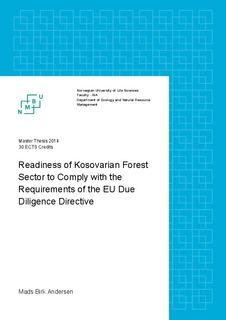| dc.contributor.author | Andersen, Mads Birk | |
| dc.date.accessioned | 2014-09-15T10:16:05Z | |
| dc.date.available | 2014-09-15T10:16:05Z | |
| dc.date.copyright | 2014 | |
| dc.date.issued | 2014-09-15 | |
| dc.identifier.uri | http://hdl.handle.net/11250/219710 | |
| dc.description.abstract | The aim of this paper is to analyze how illegal logging in Kosovo can be reduced to fulfill the EU (European Union) Due Diligence regulation (EU, 2010). The study is comprised by four main objectives that present reviews of the most important articles and reports on the topic, an overview of the laws and policy instruments and their implementation, interviews with key actors in the forest sector of Kosovo and finally an analysis and conclusion on the challenges and solutions to reduce illegal logging.
Illegal logging is a major concern for the forest sector of Kosovo. The extent of the illegal harvesting is unprecedented in the EU as it pushes the total annual harvest close to the annual increment of 1.3 million m3. The planned harvest in 2011 was 316.099,87m3, most of which is processed as technical timber, and the demand for firewood is estimated to be around 1.3 million m3 annually. Illegal harvesting fills the gap between the supply and the demand.
The laws and regulations of the forest sector are harmonized with the EU timber regulations but the implementation and enforcement of the laws and regulations is far from living up to the standards. The illegal activities are degrading the forests of Kosovo. The lack of commitment from the parliament to address the issue is exposed and the authority of the forest institutions and judicial system is undermined as they fail to act. There are inconsistencies between government institutions and a lack of coordination within the forest law framework that needs to be cleared up and the corruption that infiltrates all levels of government must be addressed. Top priority should be to stop the criminal networks that are doing the most damage to the forests.
On the short-term simple low-budget, measures should be implemented to demonstrate progress can be made. Simultaneously international actors in Kosovo should apply pressure on the Parliament to support the forest sector and commit to strategies bringing structural changes that will have a larger impact on the long-term. Complete eradication of illegal logging in Kosovo seems to be far out in the future. | nb_NO |
| dc.language.iso | eng | nb_NO |
| dc.publisher | Norwegian University of Life Sciences, Ås | |
| dc.subject | Illegal Logging | nb_NO |
| dc.subject | Master Skogfag | nb_NO |
| dc.subject | Forest Management | nb_NO |
| dc.subject | Kosovo | nb_NO |
| dc.subject | Forest Policy | nb_NO |
| dc.subject | Due Dilligence | nb_NO |
| dc.title | Readiness of Kosovarian forest sector to comply with the regulations of the EU Due Diligence Directive | nb_NO |
| dc.type | Master thesis | nb_NO |
| dc.subject.nsi | VDP::Agriculture and fishery disciplines: 900::Agriculture disciplines: 910::Forestry: 915 | nb_NO |
| dc.subject.nsi | VDP::Social science: 200::Political science and organizational theory: 240::International politics: 243 | nb_NO |
| dc.source.pagenumber | 91 | nb_NO |
| dc.description.localcode | M-NF | nb_NO |
